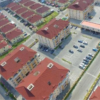Investing in Nigerian real estate from abroad is a lucrative opportunity for Nigerians in the diaspora or global investors looking to capitalize on the country’s housing deficit and rapidly growing urban population. Lagos, the economic nerve center of Nigeria, remains one of the most sought-after locations for real estate investments due to its high property appreciation rates, rental yields, and bustling economy. However, buying property remotely can feel daunting. This guide simplifies the process, helping you avoid pitfalls and maximize your returns.
Why Invest in Nigerian Real Estate from Abroad?
- High Return on Investment (ROI): Cities like Lagos see annual property value increases ranging from 10% to 15%.
- Growing Housing Demand: Nigeria’s housing deficit, estimated at over 20 million units, creates constant demand for residential and commercial properties.
- Favorable Exchange Rates: For Nigerians in the diaspora, converting foreign earnings into naira can provide a significant purchasing advantage.
- Diversification: Real estate offers a tangible, stable investment option compared to more volatile financial markets.
Key Steps to Investing in Nigerian Real Estate from Abroad
1. Define Your Investment Goals
- Purpose: Are you buying for rental income, resale value, or personal use?
- Budget: Determine how much you are willing to invest. Consider both the property price and additional costs like taxes and agency fees.
- Timeline: Decide if this is a short-term or long-term investment.
2. Research the Lagos Real Estate Market
Lagos is divided into Mainland and Island areas, each with unique opportunities:
- Island: Locations like Lekki, Ikoyi, and Victoria Island cater to luxury property buyers and high-net-worth individuals.
- Mainland: Areas like Yaba, Surulere, and Ikeja offer more affordable options with great rental yields.
- Emerging Areas: Ibeju-Lekki and Epe are rapidly growing hubs with affordable land prices and significant long-term ROI potential.
Also read: How to Verify Property Documents Remotely When Investing from Abroad
Key Resources for Market Research
- Lands of Nigeria Blog: Read articles and guides tailored for real estate investors.
- Property Portals: Websites like PropertyPro.ng and PrivateProperty.com.ng list available properties with current market prices.
- Lagos State Land Bureau Tool: Use Lagos State’s Land Online platform to verify property ownership and check land titles.
3. Work with Reputable Professionals
- Real Estate Agents: Choose agents registered with the Nigerian Institution of Estate Surveyors and Valuers (NIESV).
- Lawyers: Hire a property lawyer to verify ownership documents, draft contracts, and provide legal advice.
- Surveyors: Engage a licensed surveyor to inspect land boundaries and ensure compliance with zoning laws.
Red Flags to Avoid
- Properties without proper documentation (e.g., Certificate of Occupancy, Governor’s Consent).
- Agents unwilling to provide clear ownership details.
- Properties with contested ownership or land use disputes.
4. Utilize Property Search Tools
The Lagos State Government’s Lands Online Platform simplifies property verification. It allows you to:
- Search property titles.
- Check for encumbrances.
- Confirm ownership details.
5. Finance Your Investment Strategically
For diaspora Nigerians, consider the following financing options:
- Savings: Convert foreign income to naira for competitive exchange rates.
- Diaspora Mortgage Programs: Some Nigerian banks, like UBA and GTBank, offer mortgage products tailored for Nigerians abroad.
- Installment Payment Plans: Many developers offer flexible payment plans, allowing you to spread costs over time.
6. Understand Property Documentation
Ensure the property you’re purchasing has the correct documents, including:
- Certificate of Occupancy (C of O): Establishes legal ownership.
- Deed of Assignment: Details the transfer of ownership from the seller to you.
- Survey Plan: Identifies the property’s boundaries.
- Governor’s Consent: Required for any property transfer in Lagos.
7. Inspect the Property (Virtually or Physically)
If you can’t travel to Nigeria, arrange for a trusted representative or professional to conduct a property inspection. Request detailed photos or videos of:
- Structural integrity.
- Accessibility (e.g., proximity to roads, schools, or commercial areas).
- Available amenities like electricity, water supply, and security.
8. Leverage Technology and Property Management Services
- Remote Monitoring: Use smart security systems to monitor your property remotely.
- Property Managers: Hire property management firms to handle tenant sourcing, rent collection, and maintenance.
9. Negotiate Smartly
Property prices are often negotiable. Work with your agent or lawyer to secure a competitive price.
10. Close the Deal
- Ensure all payments are made through traceable channels (e.g., bank transfers).
- Obtain a receipt for each transaction.
- Register the property with the state government for official documentation.
Top Investment Opportunities in Lagos for Diaspora Investors
- Short-Term Rentals (Airbnb): High demand in areas like Lekki Phase 1 and Victoria Island.
- Land Banking: Invest in developing areas like Ibeju-Lekki, where land values are set to skyrocket due to projects like the Dangote Refinery and Lekki Deep Sea Port.
- Commercial Spaces: Ikeja and Yaba are prime locations for office and retail investments.
Let’s Hear From You!
What excites you most about investing in Nigerian real estate? Do you have questions about property verification, financing, or market trends? Share your thoughts in the comments below—let’s discuss how to make your investment a success!




